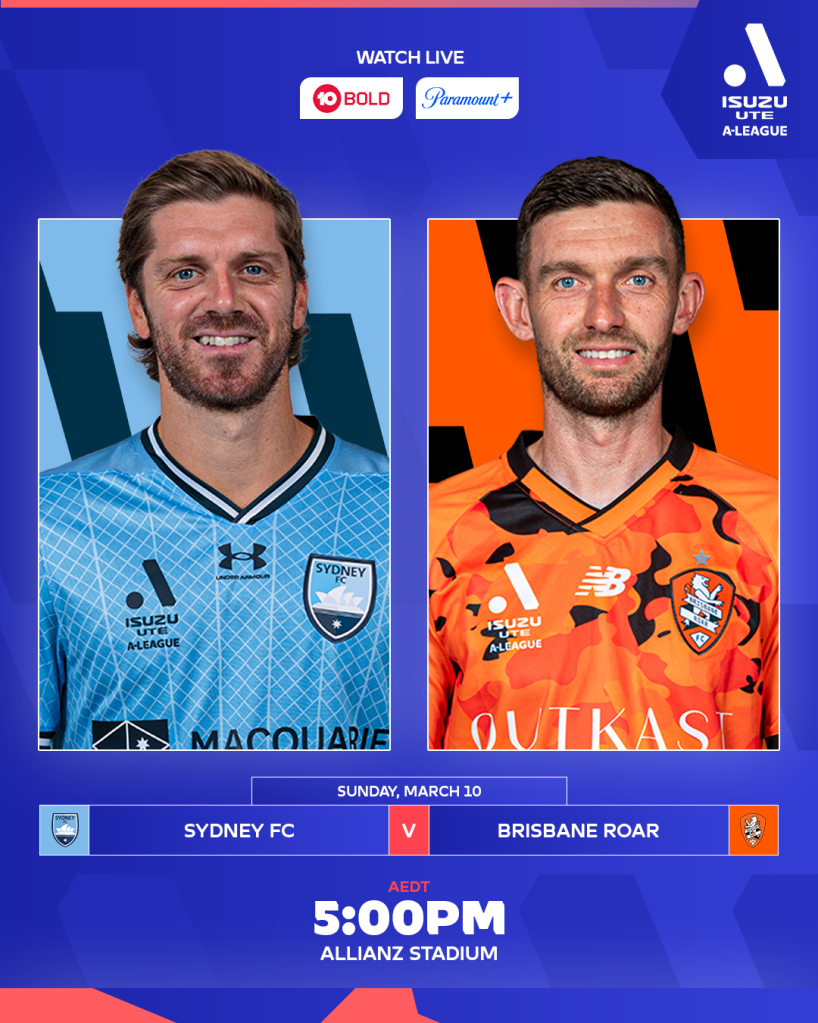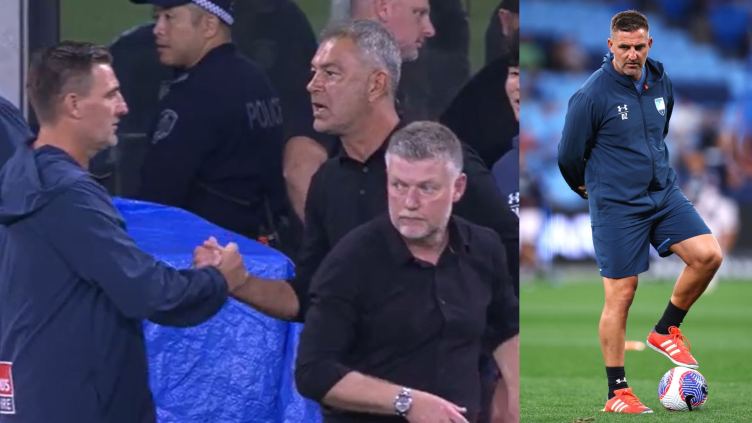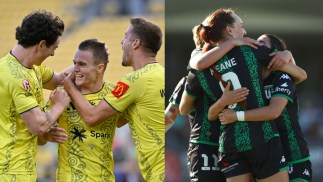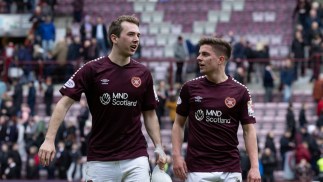David Zdrilic has the Red Bull philosophy in his DNA, having learnt from Ralf Rangnick, Julian Nagelsmann and Ralph Hasenhuttl. The former Socceroo has brought those learnings back to Sydney FC. He speaks to aleagues.com.au about his journey and how Ufuk Talay’s Sky Blues are taking the A-Leagues by storm.
Socceroos great David Zdrilic invested years of hard work and thousands of dollars into becoming a head coach, earning the highest qualification available in Asia in the hope of reaching the very top of the game.
But when he arrived in Europe, he had to start all over again, with his AFC Pro License not recognised by UEFA.
So in total, according to Football Australia’s coaching overview, Zdrilic spent around $20,000 on a qualification that was not recognised in Europe. If you factor in flights and accommodation, the outlay was closer to $30,000 as he had to return from Germany four times to complete it.
ISUZU UTE A-LEAGUE R20 PREVIEW: One game left for Reds to avoid equal-club low & home ground curse
Zdrilic isn’t the only Australian to encounter this AFC issue in Europe. During Kevin Muscat’s stint with Sint-Truiden in Belgium in 2020, his AFC Pro License didn’t suffice. So, the former Melbourne Victory boss could not take training or be involved in games, and was moved into a role of technical advisor.
It has been an incredible journey for the former striker, who has worked for the likes of RB Leipzig and Genoa, while his AFC badges wreaked all kinds of havoc in Europe – from different job titles to contracts. At Genoa, for example, he was an unofficial assistant coach in Serie A.
It prevented him from furthering his career in Europe, which is part of the reason he is back in the A-Leagues with Sydney FC.
He has been forced to start from scratch. The Australian is currently working towards his UEFA Pro License but the whole process will take at least five years.
So by the end of it all, he will have two Pro Licenses!
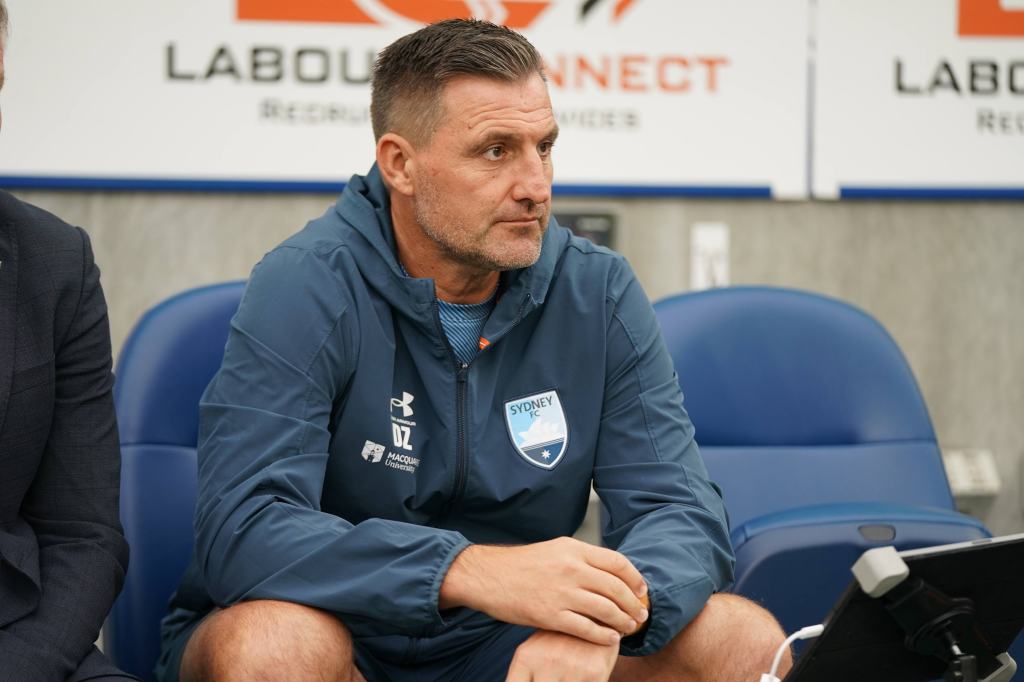
“It was difficult because you work hard and spend a lot of money to get your licenses in Asia and I got the top license and it’s worth absolutely zero in Europe. There wasn’t any way to navigate it,” Zdrilic told aleagues.com.au.
“When I first went to Leipzig, I went as assistant coach but in the second year we were talking about me taking over one of the teams. Within a year, I would’ve had my own team and that’s when it became apparent that I wasn’t able to do that because of the license.
“I had to make a decision to continue the journey as an assistant coach. (In) MLS, I didn’t have a problem but (I) had the same issue in Belgium and Genoa.
“A different title and contract…. it just becomes annoying for everyone involved because they have to find a way to get around this problem. That in the background was creating issues for me to get further. My contracts always had to be converted into not sporting contracts but basically employment contracts, which created other issues.
“Soon I’ll have my A license which will allow me to at least be an assistant coach in Europe without a problem but it still doesn’t allow me to be a head coach. I need a Pro License.”
It means Zdrilic is back in Australia and Sydney FC are reaping the benefits of his learnings abroad, which includes spells as an assistant at Chicago Fire in MLS, KV Oostende in Belgium’s top flight and Serie A outfit Genoa.
A disciple of Ralf Rangnick’s gegenpressing phenomenon at RB Leipzig, the Sydney assistant coach has helped implement that high-pressing vision with the support and trust of Sky Blues boss Ufuk Talay.
Sydney are now a pressing machine.
“The most important thing is that the head coach, the collaboration,” said Zdrilic, who arrived at the start of the season. “We played together and are good mates. Working together is seamless. The trust he has that I’m able to contribute and help implement something like this press. There’s a lot of detail behind it but if the trust and belief are there…
“If you have the structure, the philosophy but also the training methodology behind it, then it’s not difficult to implement it. Like any philosophy, if you have your belief and know how to implement it, then it’s just a matter of the time and the players available.
“It’s a little bit trickier when you start doing it mid-season and without having a full season of producing, especially the high pressing. We did start that process but now it’s really kicked into gear. It’s really intense. The repeat sprint endurance that the players have now. Where they’re able to sprint for longer periods of time is evident.
“If all the training and the loads are all in the right place, it can come together pretty quickly. I think you saw when Uffie came in and we started working on the press in this way, it started happening very quickly. Now we’ve been able to build on it, increase it and adapt it and improve it. The journey has been very enjoyable in watching it evolve.”
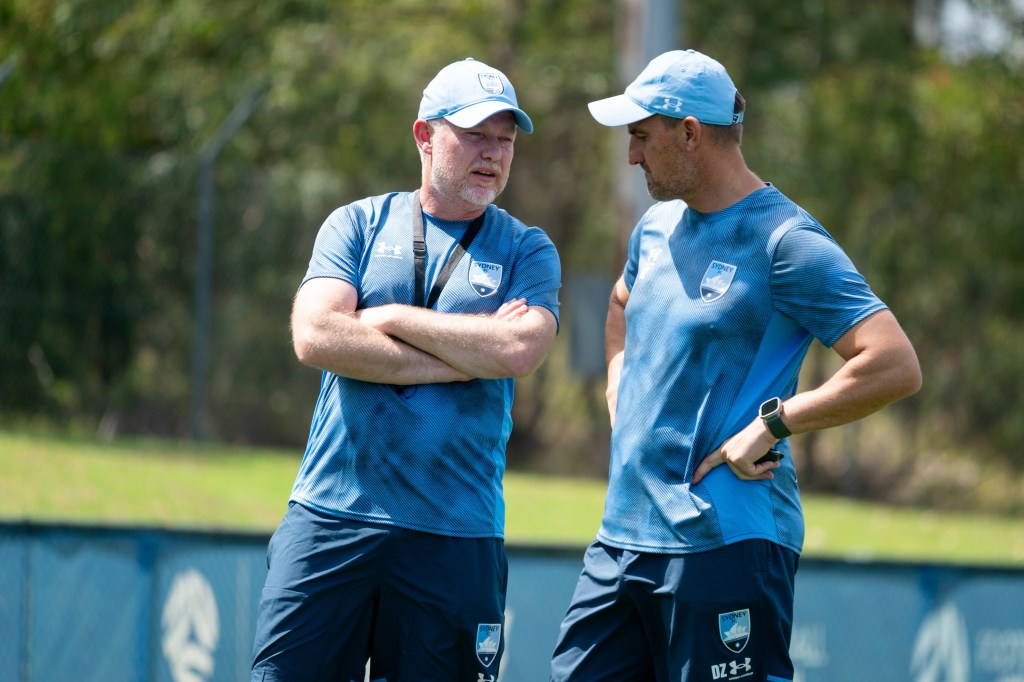
Talay, with Zdrilic in his corner, has transformed Sydney since replacing Steve Corica in November.
Sydney’s high-octane brand of football and relentless pressing style have seen the team catapult themselves into the top six – the Sky Blues are just two points behind third-placed Macarthur FC with a game in hand.
They have scored more goals (17) and outpaced their Expected Goals by more (+3.68) than any other team in the Isuzu UTE A-League since the beginning of Round 13. No team has forced more high turnovers in the league since the beginning of Round 13 than Sydney(76).
Brisbane Roar (46) – Sunday’s opponents – are the only team to have won possession in the final third more times than Sydney (43) since the beginning of Round 13.
All of the above was on show in Sydney’s 4-0 rout of city rivals Western Sydney Wanderers last week.
“The first thing is that the training methodology produces (is) moments which then show the players the reward out of playing this way,” Zdrilic explained.
“As you’ve seen, when you’re pressing, especially high pressing, you win the ball and it’s one pass to a clear chance on goal if it’s done correctly. You’ve seen with some of the chances we’ve created. Those kind of moments are created from this pressing.
“Obviously the training methodology, it’s a different type of training. Often training they’re not used to. But it is quite enjoyable because, yes it is pressing, but it is a lot of winning the ball and scoring goals in intense training.
“Once the players see the results and that often happens very quickly, especially in training sessions, they get the belief from that. When it happens in games and you can see the fruits of it, the player buy-in is there.
“But it’s very important that you don’t waver from your belief and philosophy. If you have that from your coach, assistant coach, team and the whole club essentially, then the buy-in is there. If you don’t buy-in, you won’t be part of the journey. I guess that’s the same with any philosophy.
“But you’re right, everyone has to be part of it. If a player isn’t joining in, then they are going to leave gaps and they are gaps the opposition can exploit and that’s what we don’t allow.”
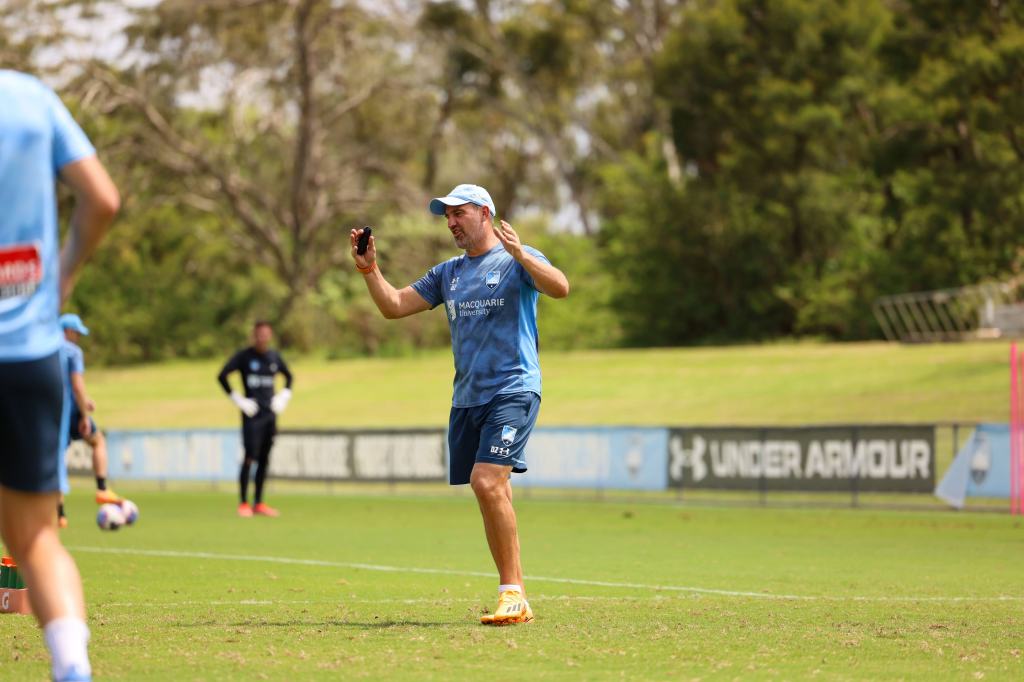
Zdrilic continued: “It’s a collective effort. Obviously the guys up front (are) the first trigger point, but it’s a whole mechanism and the mechanism is everyone is synchronised and working together.
“There’s different pressing structures. We’re pressing high more often than not. But when you look at Leipzig teams, Ralf Rangnick teams and even Liverpool, they’re not always pressing the first ball up high. They’re waiting for a trigger. There’s different mechanisms and heights.
“For us, yes the strikers are the first ones leading the press but everybody is coming up behind that.”
Zdrilic was credited for his work behind the scenes after Sydney’s derby mauling over the Wanderers at CommBank Stadium in Round 19.
Western Sydney boss Marko Rudan told reporters: “This is a lot of his doing. This is the Red Bull system and how they press.”
Talay added: “The knowledge he has brought from working at Red Bull has definitely helped us in that sense. I don’t want to say it’s just my work. It’s been a great collaboration with Davey as well to get the boys to that level.”
It all comes down to his experiences with the godfather of gegenpressing – Rangnick – both as a player in Germany and a coach at RB Leipzig, as well as highly-rated coaches Julian Nagelsmann and Ralph Hasenhuttl.
Zdrilic was part of the Red Bull family for three years, working across Leipzig’s Under-17 and Under-19 teams.
It was a priceless education for the 49-year-old, who was exposed to the transformative philosophy in an environment that demanded excellence 24/7. Even the academy system had to operate and perform at a first-team level.
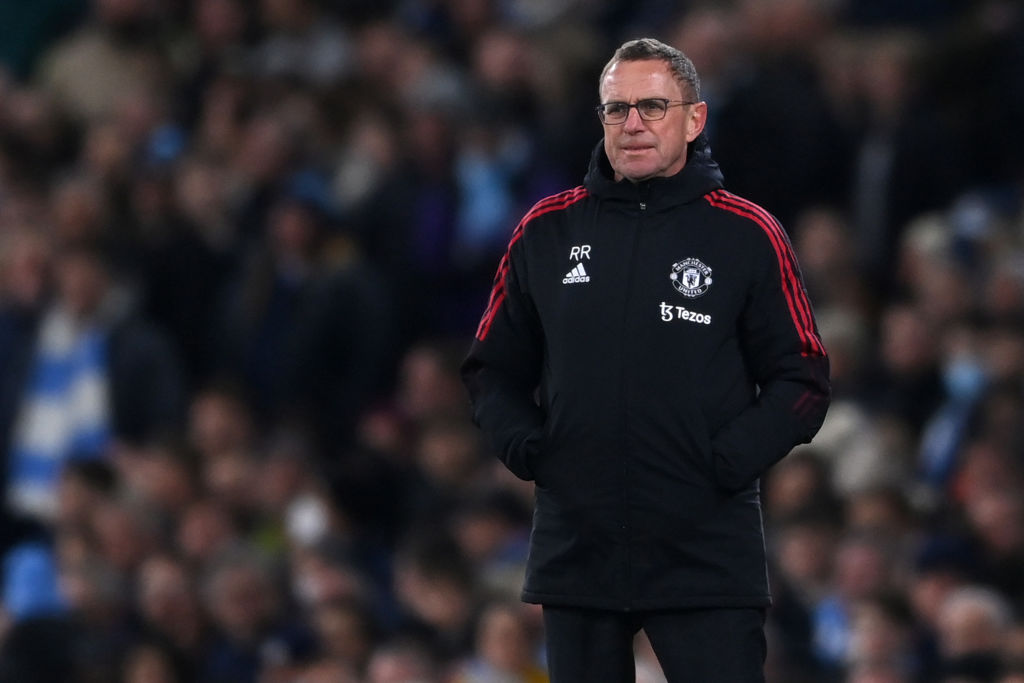
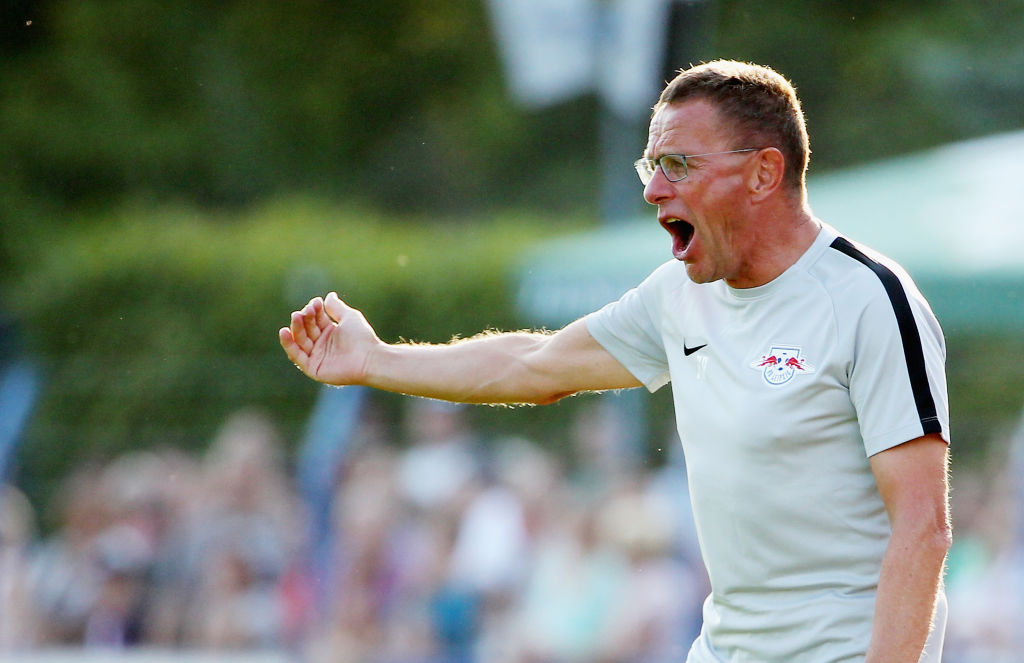
“Like Hasenhuttl and Naglelsmann, they obviously have different ways of implementing the philosophy. It’s not a one-size fits all. So to learn from all three of them, watching their sessions was very beneficial,” he reflected.
“When we were with the U19s, that was the second team. A lot of our players were used to train and often play. The connection between the U19s and first team was very close.
“We had to be aligned with them. The mentors and the way they spent so much time with us… it was very important.”
Rangnick is seen as an innovator who is known for his high-pressing philosophy and influence on some of German football’s brightest minds, including Thomas Tuchel.
Zdrilic knows him better than most – the pair’s relationship dates back to 1998. Before linking up at RB Leipzig, the Aussie was signed by Rangnick during his time as head coach of 2.Bundesliga outfit SSV Ulm – who had just stepped up from the third tier of German football.
Ulm’s only ever Bundesliga season was in 1999-2000 after Rangnick and Zdrilic teamed up in the second division.
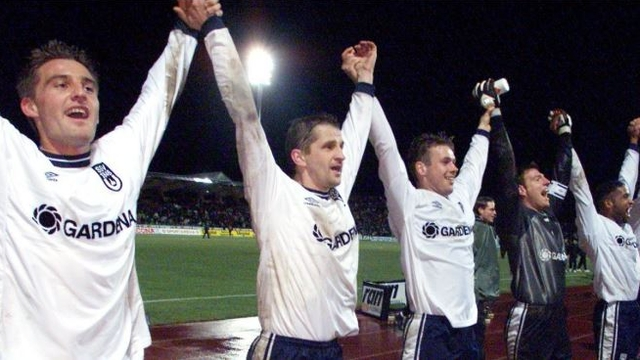
“One story of Ralf Rangnick. We had a youth league game against Zenit, he was just sitting there in the dressing room at half-time, unannounced,” Zdrilic recalled from his time as an assistant youth coach at Leipzig.
“You could feel that pressure of his presence being there on us to deliver the half-time talk.
“That kind of pressure was great because it helped you develop. I really enjoyed that side of it. You think you’re in the academy, but you’re expected to get results, develop players and you’re expected to develop a philosophy. All of that is being monitored 24/7 by Ralf and everyone at the club.
“Then the fruits of it now can be seen by me being able to implement that myself, and be able to drive it and hopefully replicate some of that in what we’re seeing now.”
The Red Bull philosophy is firmly ingrained in Zdrilic. It’s part of his DNA.
He identified with the type of football as a player and it’s how he sees football through the lens of a coach.
“The actual philosophy has incredible detail to it. When I first went there, I saw that they were pressing and I go okay, I want to learn everything about this,” he said.
“One of the mentors when he was there, he was explaining it to me. We spent a whole day going through the philosophy, the different training methods and tactical methods. I was just blown away.
“One of the comments he said to me was ‘you’ll need to take a few weeks to go through all of this for it to really sink in’. I was like a few weeks? I couldn’t fathom that at that time, that it would take me so long. But then when I left and really went through it, it was a lot longer than a few weeks.
“This philosophy is so different to normal philosophy where the focus is build up. Everything is in reverse and it almost goes against the grain.
“The first year was just really absorbing as much as I could. I knew I wasn’t understanding everything and I wasn’t able to process everything. The second year I was able to really understand and start processing in a way where I was able to really provide more input.
“The third year was where I was able to make it my own and add my thoughts on it. It became part of it.
“There is a German word, which translates to like it’s part of your DNA. Once it becomes that, it’s so easy for you to produce that.”
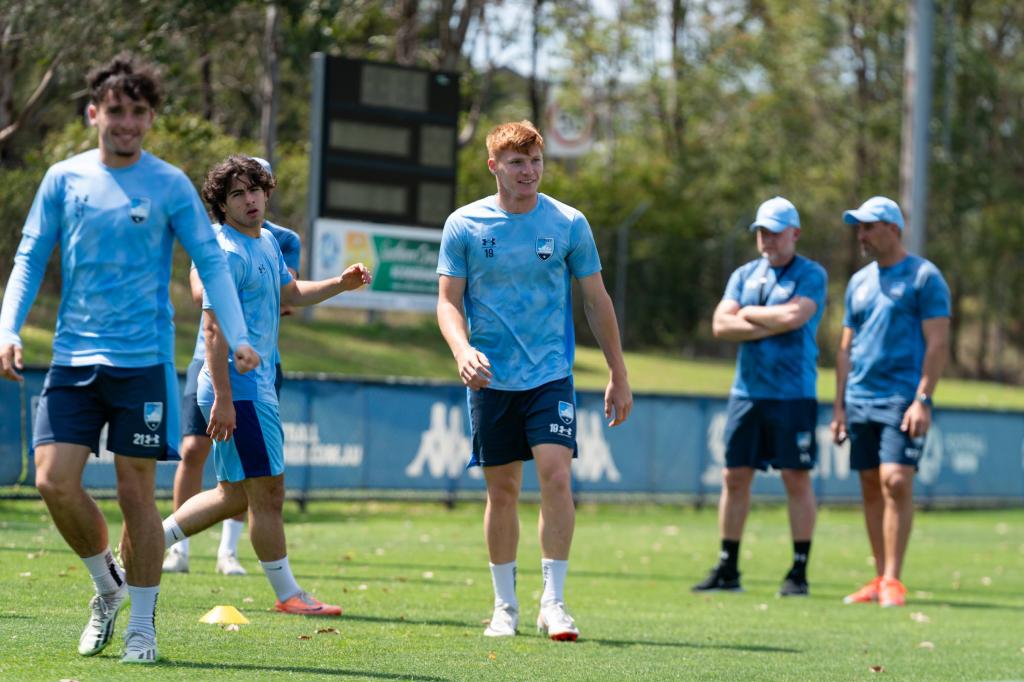
He continued: “Since going there and seeing the way it works and the way it can work in many different environments, the reason is because when you think about the four phases of the game – ball possession, when you don’t have the ball and the two transition moments.
“Three of those moments, in terms of when the opponent has the ball (pressing part) and the two transition moments are almost perfected with this philosophy. It’s very difficult to imagine that you could be more intense in terms of applying it if you apply it with a constant 90-minute press. That’s why I liked it because I think it’s very difficult to do more than that. At the very least, you’re getting the highest quality education in the very least three parts of the game.
“Now Leipzig have evolved more into the build up possession part of it, the whole complete package. Yes you can play many different ways, but you can do many things with this philosophy. It suits me and it’s part of my DNA.”
Zdrilic returned to the Harbour City – where he played for Sydney FC between 2005-08 – last year after an “unthinkable” experience at Genoa.
Together with head coach Alexander Blessin, who he coached under at Leipzig, the pair were poached by the Serie A club after impressing at Oostende.
The mid-season move to Genoa in January 2022 made Zdrilic the first Australian to hold a coaching position in Serie A – though he was forced to operate under a different job title due to his AFC License not being recognised.
His time at Luigi Ferraris Stadium came to an end when Blessin was sacked in December after Genoa had been relegated from the top flight the season prior.
“It was a fantastic experience,” Zdrilic said. “Who would’ve thought I could possibly coach in Serie A at such a level. It was just unthinkable.
“Even when I went overseas to Leipzig, I knew I was in a high environment but I still never thought I’d end up coaching in Serie A.
“Going into that environment, what was really pleasing was the philosophy was able to be implemented very quickly even though we cane in January.
“We were eight points adrift of safety. Straight away under a lot of pressure but the philosophy took hold very quickly. We had seven draws then won. We were able to make an immediate impact which made people take notice.
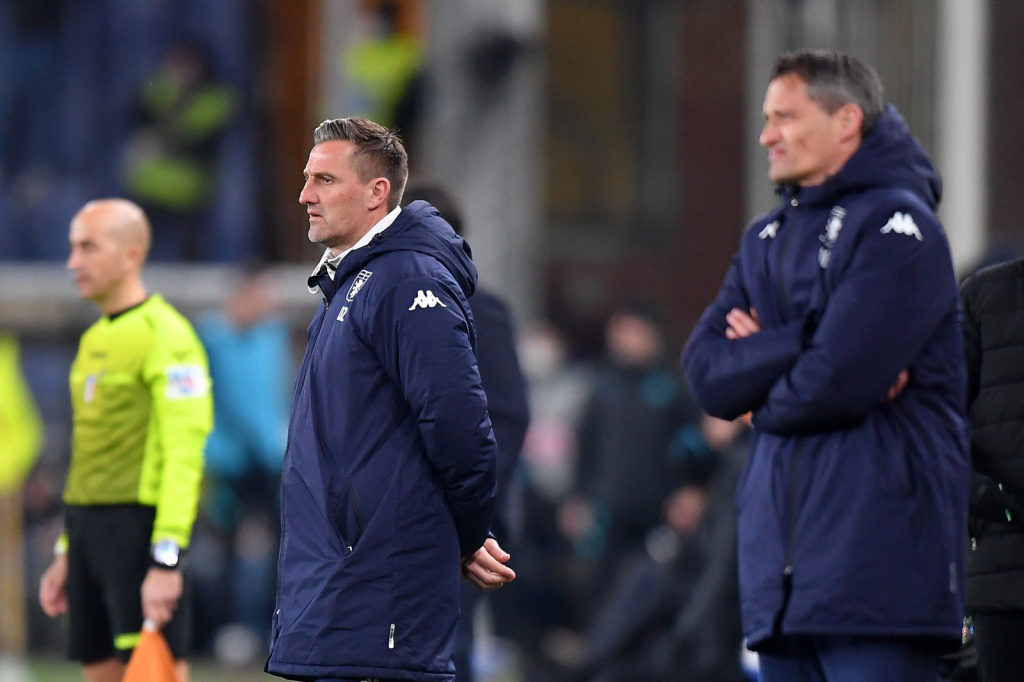
“The buy-in from the players was there because they saw the results. The belief and mentality was there.
“The most important takeaway for me, things can change very quickly especially in Europe and places like Italy. In two or three weeks, the entire picture can change. That’s the thing, to be able to manage that. It’s all good when things are going well, but you have one loss – a second loss, it’s very different over there. The pressure starts to mount.
“It’s something I really embraced. That’s football at the top level. Even when we got relegated, because we had produced good football and gave the club a chance of surviving, the fans were behind us the whole way… even when we got relegated.
“Serie B was a different story because we went from any points were a massive bonus, whereas Serie B you were expected to win every game. The pressure was totally different.”
